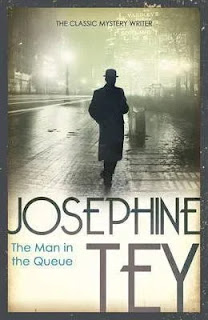This is the first in Tey’s Inspector Grant series of which there are only six, which is unfortunate because Alan Grant one of the most likeable detectives in fiction.
The Man in the Queue is a mystery surrounding the stabbing murder of a man who was lined up outside a London theatre waiting to be admitted to the last performance of a popular musical. No one had witnessed his murder and the press of people around him kept him upright until the doors to the theatre opened and he fell forwards.
He had nothing upon his person to reveal his identity and a loaded revolver was found in his pocket.
Inspector Grant is brought in to cover the investigation and by a painstaking process and some good luck, he manages to identify the victim and from there, the prime suspect.
One of the most interesting aspects of this book was the exploration of circumstantial evidence: how facts, evidence, and motives come together to pinpoint a suspect. In Grant’s mind there was a clear case to incriminate his suspect, but something felt wrong. What if all this was merely a series of accidents that were completely unrelated? What if he had arrested the wrong man?
‘Was the man by any remotest possibility telling the truth? If not, he was the most cold-blooded wretch Grant had ever had the unhappy lot to meet. But the man appeared unconscious of Grant’s scrutiny; he seemed wholly absorbed in his story. If this was acting, it was the best Grant had ever seen, and he deemed himself a connoisseur.’
Josephine Tey’s books are always satisfying reads and I enjoyed this one as much as her others. Being the first book in the series I thought it would lack some finesse but she didn’t disappoint.
The only quibble I have, if you could really call it that, is that her description of Detective Alan Grant in her first book didn’t match another description that stayed in my mind after reading The Daughter of Time. In The Daughter of Time Grant is confined to a hospital bed after an accident on the job and was wincing at the indignity of being thrown around by a small nurse he nicknamed the midget.
‘…she dealt with his six-feet-odd with an off-hand ease that Grant found humiliating.’
For years I pictured Grant as a tall, solid, garrulous type of fellow and then I read this in The Man in the Queue, which didn’t sit with the picture I had in my mind after reading The Daughter of Time:
‘If Grant had an asset beyond the usual ones of devotion to duty and a good supply of brains and courage, it was that the last thing he looked like was a police officer. He was of medium height and slight in build, and he was – now, if I say dapper, of course you will immediately think of something like a tailor’s dummy, something perfected out of all individuality, and Grant is most certainly not that; but if you can visualize a dapperness that is not of the tailor’s dummy type, then that is Grant.’
The resolution of this mystery came out of the blue and was as unpredictable as it was clever. Once again Tey has Grant romping around the Scottish Highlands which is always a treat.
